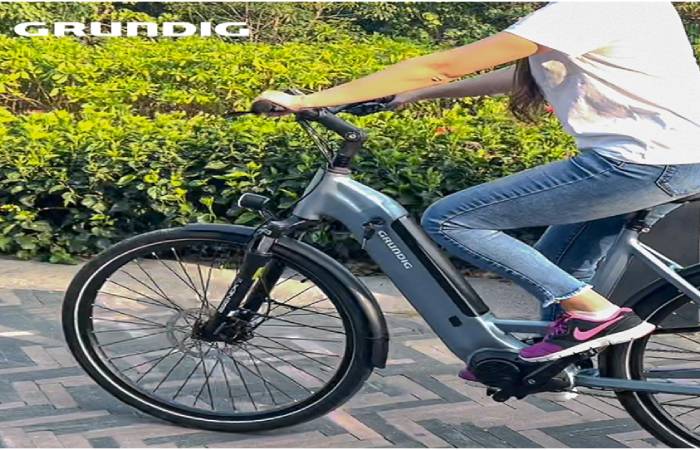E-biking is rapidly gaining attention as a fantastic way to enhance mental health while enjoying the outdoors. This activity merges physical exercise with the calming effects of nature, offering a therapeutic outlet for those dealing with stress and anxiety. Participating in outdoor exploration through e-biking not only boosts physical fitness but also significantly enhances emotional well-being.
As riders pedal through beautiful landscapes, they experience a rush of endorphins paired with the peacefulness that nature provides. The accessibility of e-bikes allows individuals of varying fitness levels to partake in this activity, making outdoor adventures achievable and enjoyable. The combination of movement, fresh air, and scenic routes creates a perfect setting for mental rejuvenation, fostering a positive mindset and reducing feelings of tension.
Engaging in regular e-biking adventures can lead to lasting changes in mental clarity and emotional health. Those seeking relief from daily stressors will find that the joy of riding through nature can transform their outlook on life.

Understanding E-Biking
E-biking merges cycling with modern technology, allowing riders to enjoy the outdoors while benefiting from an electric motor. This section will discuss what e-biking entails, compare it to traditional biking, and explore the technology that enhances accessibility.
Definition And Explanation Of E-Biking
E-biking refers to riding bicycles equipped with an electric motor that assists pedaling. This assistance kicks in during pedaling, making it easier to tackle hills and longer distances. Riders can choose the level of assistance based on their preferences and physical capability, making it a versatile option for many.
E-bikes come in various styles, including mountain, road, and hybrid designs, catering to different types of cyclists. Riders can enjoy the freedom of cycling without the same physical strain as traditional biking. This blend of mechanic support opens cycling to a wider audience.
Comparison Of E-Biking With Traditional Biking
The primary distinction between e-biking and traditional biking lies in the power assistance. Traditional bikes rely solely on human effort, which can be physically demanding, especially over long distances or hilly terrains. In contrast, e-bikes offer a motorized boost that alleviates fatigue.
E-bikes are particularly beneficial for people with varying fitness levels. They encourage those who may find traditional cycling challenging due to health conditions or age. This option can make cycling more appealing, potentially increasing participation in outdoor activities.
Overview Of E-Bike Technology And Its Accessibility
E-bike technology encompasses several components, including a battery, electric motor, and a controller that regulates power output. Most e-bikes utilize lithium-ion batteries known for their durability and efficiency. The technology allows riders to enjoy longer rides without worrying about running out of power.
Additionally, the accessibility of e-bikes has improved significantly. Electric models are now available in various configurations, enabling almost anyone to find a suitable option. With advancements like battery longevity and user-friendly controls, e-biking is more approachable than ever. This accessibility supports a growing interest in outdoor exploration among diverse populations.
Mental Health Benefits Of E-Biking
E-biking provides numerous mental health advantages, emphasizing stress reduction, mood enhancement, and opportunities for social engagement. The combination of outdoor exploration and physical activity fosters emotional well-being and community connection.
Reduction Of Stress And Anxiety Through Outdoor Exploration
Engaging in outdoor activities like e-biking can significantly alleviate stress and anxiety. The natural surroundings combined with the rhythmic motion of cycling promote a sense of tranquility. Fresh air is vital for mental clarity and helps lower cortisol levels—often referred to as the stress hormone.
Studies indicate that even short rides can provide immediate relief from anxiety. Those experiencing heightened stress can find comfort in the predictable routine of riding. This method serves as an effective tool for managing mental burdens without the intense effort required by traditional cycling.
Enhancement Of Mood And Overall Emotional Well-Being
E-biking leads to the release of endorphins, which are known as “feel-good” hormones. Regularly engaging in this physical activity can contribute to long-term improvements in mood and emotional health. Cycling also increases feelings of happiness and satisfaction, as participants often experience a sense of achievement following a ride.
Moreover, e-biking is accessible for various fitness levels, encouraging individuals to participate. The ability to adjust the level of assistance makes it easier for individuals who may struggle with traditional biking. Enjoying beautiful landscapes while cycling can further elevate one’s mood, creating a fulfilling experience.
Promotion Of Physical Health And Its Correlation With Mental Wellness
Physical health is closely tied to mental wellness. E-biking not only improves cardiovascular health but also promotes weight management. Regular biking helps with muscle strength and increases stamina, which can lead to higher energy levels throughout the day.
The act of cycling can also facilitate better sleep, which is essential for mental health recovery and overall well-being. The calories burned while biking can contribute to weight loss and boost self-esteem. Participants often notice that their improved physical condition enhances their mental outlook and resilience against stressors.
Opportunities For Social Interaction And Community Building
E-biking opens avenues for social engagement, which is crucial for mental health. Whether joining cycling groups or connecting with friends on rides, the communal aspect fosters a sense of belonging. Engaging with others aids in reducing feelings of isolation, a common issue faced during times of stress.
Additionally, e-biking can be part of group events or community initiatives, allowing like-minded individuals to connect. This shared experience can enhance motivation and accountability while riding. Building friendships through these interactions creates lasting support networks, reinforcing positive mental health.
Tips For E-Biking For Mental Health

E-biking offers a unique way to improve mental well-being through fun outdoor exploration. By carefully selecting the right bike, exploring scenic routes, prioritizing safety, and incorporating mindfulness, riders can enhance their experience.
Choosing The Right E-Bike For Individual Needs
Selecting the appropriate e-bike is crucial for a fulfilling experience. Consider factors like the terrain, rider height, and intended use. For those commuting, a lightweight model may be ideal, while off-road enthusiasts might prefer a sturdier design.
Look for adjustable features, as these can improve comfort and usability. The type of motor and battery range also plays a significant role. A bike with a long-lasting battery allows for extended rides without worrying about recharging.
For comprehensive guidance on selecting an e-bike that suits personal needs, refer to resources that provide insight into different e-bike types.
Recommended Scenic Routes And Locations For E-Biking
Exploring scenic routes enhances the mental health benefits of e-biking. Local parks, trails, and riverside paths offer a tranquil environment to unwind. Riders might enjoy exploring national parks, which often provide dedicated cycling paths through breathtaking landscapes.
Consider routes that include natural elements like lakes, mountains, or forests, as these settings can boost feelings of happiness and reduce stress. Special recommendations include areas known for their wildlife and serene scenery.
Maps and online resources can help identify popular biking trails that prioritize breathtaking views and smooth rides.
Safety Tips And Best Practices For A Fulfilling Experience
Safety should always be a priority. Always wear a helmet and consider additional protective gear, especially on busy roads. Ensure the e-bike is in good condition by checking the brakes, lights, and tire pressure before setting out.
Being aware of traffic rules is essential for safety on shared paths. Riders should signal turns and maintain a safe distance from others. Having a repair kit handy can also prevent minor issues from becoming major problems and keep the ride enjoyable.
Prioritizing safety allows cyclists to focus on their mental wellness rather than worry about potential accidents.
Incorporating Mindfulness And Reflection During Rides
E-biking can double as a form of moving meditation. Riders should consciously engage with their surroundings, paying attention to the sights, sounds, and scents experienced during the ride. This practice can enhance relaxation and mindfulness.
Taking moments to pause and reflect at scenic spots can further enrich the experience. Deep breathing techniques while riding can also help reduce anxiety levels. By fostering a connection to nature, individuals can find peace and contentment on their journeys.
Emphasizing mindfulness can transform a simple ride into a profound experience, enhancing overall well-being while enjoying the outdoors.
Conclusion
E-biking offers significant mental health benefits, enhancing well-being through physical activity and outdoor experiences. Engaging in this enjoyable form of exercise can lead to improved mood, reduced stress, and a stronger sense of connection to nature.
Recap Of The Mental Health Benefits Associated With E-Biking
E-biking provides both physical and psychological advantages. The activity promotes the release of endorphins, which can alleviate feelings of stress and anxiety. Additionally, spending time outdoors while cycling can lead to greater feelings of happiness and relaxation.
Regular e-biking can combat symptoms of depression by fostering a sense of accomplishment after completing rides. The combination of fresh air, physical exercise, and social interaction can contribute to improved sleep patterns, further enhancing mental well-being.
Research shows that those who engage in outdoor activities like e-biking are more effective in managing their mental health compared to sedentary individuals. Ultimately, e-biking serves as a versatile tool for boosting emotional resilience and overall quality of life.
Encouragement To Explore E-Biking As A Means Of Enhancing Mental Wellness
Individuals seeking to improve their mental health can greatly benefit from e-biking. This activity allows one to blend physical fitness with exploration, making it both accessible and enjoyable.
Many people, regardless of fitness level, can participate in e-biking. The pedal-assist feature allows cyclists to customize their effort, making long rides more manageable.
There are numerous local trails and scenic routes to explore, creating opportunities for adventure. Joining a community or a group ride can further enhance social connections, providing additional emotional support.
Try scheduling regular e-biking sessions to establish a routine that fosters mental wellness. This habit can enhance mood and provide a satisfying break from daily stressors.
Final Thoughts On The Importance Of Outdoor Activities For Overall Health And Happiness
Engaging in outdoor activities like e-biking plays a critical role in maintaining good mental health. Nature has a calming influence, allowing individuals to recharge while benefiting from physical exercise.
The act of cycling outdoors fosters mindfulness, enabling riders to immerse themselves in their surroundings. This connection to nature has been shown to improve emotional well-being and reduce feelings of isolation.
Promoting outdoor exploration should be a priority for those interested in holistic wellness. E-biking stands as a practical and enjoyable method to integrate more time outdoors into a busy lifestyle, making it easier to embrace an active routine that uplifts the spirit.